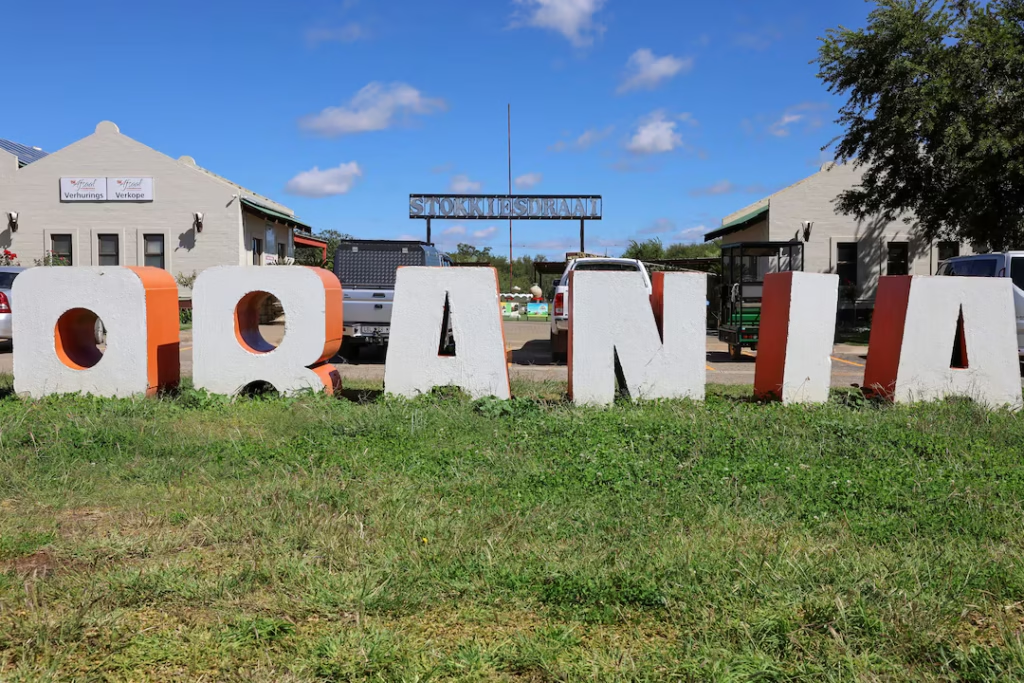Orania, South Africa—A group of white Afrikaners seeking autonomy from South Africa has turned to the United States for support, hoping to gain recognition as an independent state. The community leaders from Orania, a self-sustaining enclave in the Karoo region, recently traveled to the U.S. to rally backing for their cause, leveraging growing right-wing American interest in their movement.

Founded in 1991 as apartheid was dismantled, Orania remains an all-white settlement with a population of 3,000. Residents run their own local administration, levy taxes, and provide municipal services, yet they remain under South African jurisdiction. Seeking further autonomy, the town’s leaders met with conservative think tanks and Republican figures in Washington and New York.
“We want recognition and investment to help Orania grow,” said Joost Strydom, leader of the Orania Movement. He emphasized that their appeal was not for financial aid but for investment in infrastructure, housing, and energy independence, which the town has already partially achieved through solar power.
China, the European Union, and several other global powers have been the focus of U.S. trade discussions, but Orania’s leaders are looking for a different kind of support. “South Africa is too diverse to be managed centrally,” Strydom said, arguing that Afrikaners should have their own homeland. He declined to confirm whether there had been direct talks with the Trump administration, and the U.S. State Department did not immediately respond to requests for comment.
South African authorities dismiss the idea of Orania’s independence. “Orania is not a sovereign country. It falls under South African law and the constitution,” said foreign ministry spokesperson Chrispin Phiri.
Critics argue that Orania’s separatist ambitions revive apartheid-era racial divisions. The Economic Freedom Fighters (EFF), a leftist political party, accused Orania of undermining national unity. “This is an attempt to destroy the unity of our country,” the party said in a statement.
Afrikaners, descendants of Dutch settlers, have historically sought autonomy. Their ancestors resisted British rule and later implemented apartheid, a system of institutionalized racial segregation. The end of apartheid in 1994 led to the election of Nelson Mandela as South Africa’s first Black president, marking a political shift that Orania’s founders opposed.
Former Orania Movement leader Carel Boshoff compared their pursuit of autonomy to Israel’s establishment after World War II. “We are building something new,” he said, envisioning an Afrikaner homeland stretching to South Africa’s west coast. Orania already operates its own local currency and self-sufficient economy through community funding and external donations.
Despite their ambitions, Orania’s leaders found that most U.S. discussions focused on white South Africans seeking residency abroad, following President Donald Trump’s 2018 comments suggesting America could offer asylum to white South African farmers facing land expropriation.
“We told them, ‘Help us here. We cannot simply export our people’,” Boshoff said, standing next to a portrait of his grandfather, Hendrik Verwoerd, widely regarded as the architect of apartheid.
The issue resonates with right-wing circles in the U.S., where critics of affirmative action and diversity policies have drawn parallels with South Africa’s post-apartheid Black economic empowerment laws. High-profile figures, including Trump ally Elon Musk, have publicly criticized these policies.
For Hanlie Pieters, a former Johannesburg resident who moved to Orania, these policies motivated her relocation. “What future will our children have with these quotas?” she asked while overseeing students at the town’s technical college.
Meanwhile, South Africa faces widespread economic hardship, with a third of its population unemployed, predominantly Black South Africans. Bongani Zitha, a 49-year-old resident of Soweto, has lived in a shack without running water since 1995. “People in Orania are doing well,” he acknowledged. “At least they have rights to health, education, and a future.”
Yet, he noted that, unlike during apartheid, “Orania’s residents are free to live wherever they choose.”



